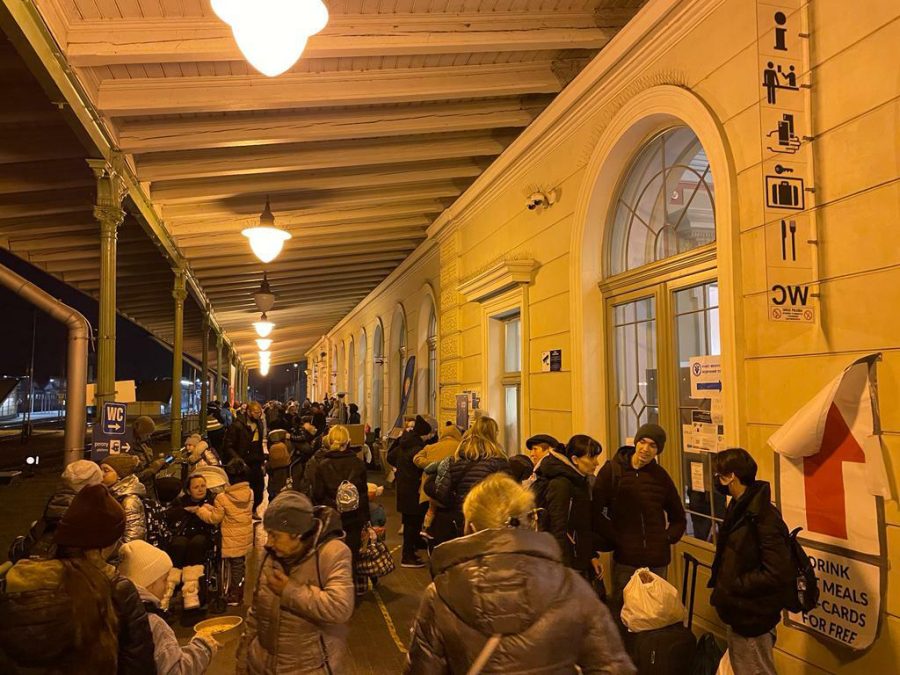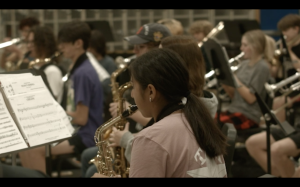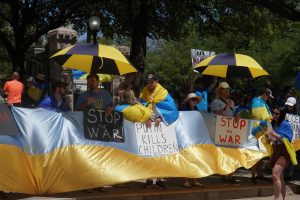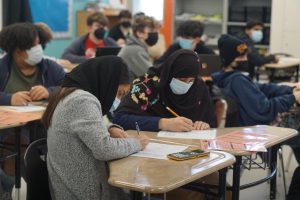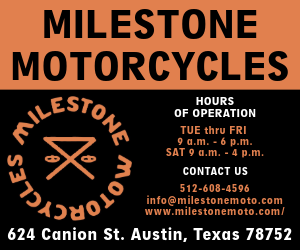Between the borders
St. Stephen’s sophomore spends spring break in Poland assisting fleeing Ukrainian immigrants
Photo courtesy of Sasha Konradi.
Around 11 p.m. at the train station in Przemsl, Poland, a crowd of refugees tries to figure out a place to stay for the night before their train the next morning. Much of the Konradis work was helping refugees with no other place to go. They helped refugees find tickets, apartments or whatever they needed. Sasha says her time in Poland has opened her eyes to the world of volunteering.
April 14, 2022
Sasha Konradi wears an orange vest in Przemysl, a town on the Poland-Ukraine border.
All the volunteers wear orange vests.
She’s there to help in any way she can.
Translating between English and Russian. Carrying luggage. Passing out food. Entertaining small children of weary mothers.
“All the Ukrainians were very stressed and unsure of what was coming next because a lot of them had no plan,” Sasha said. “They were just there panicking. They basically lost their previous lives.”
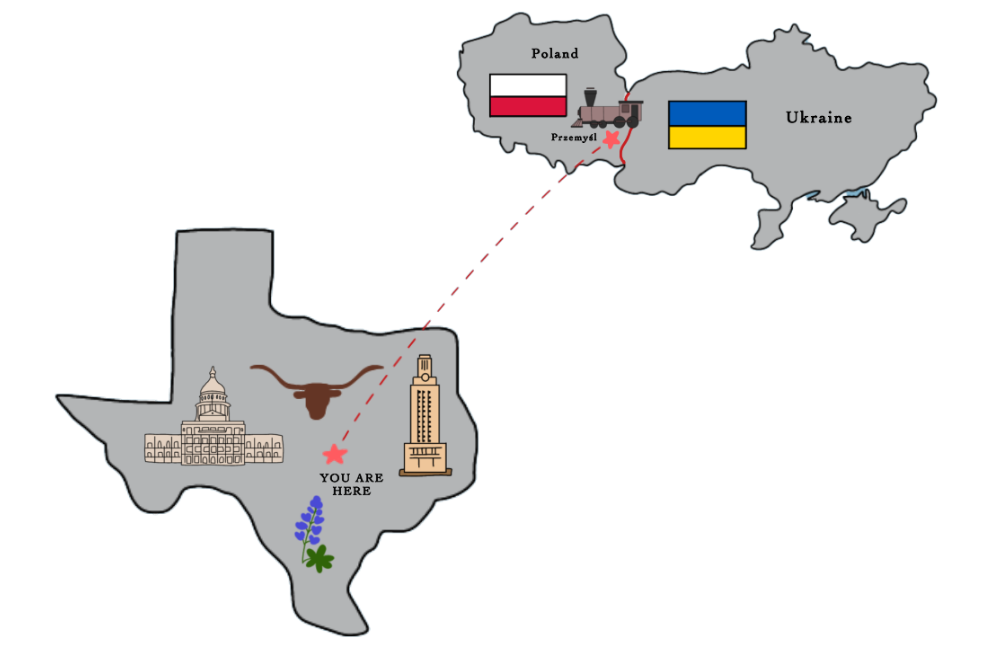
Sasha is a sophomore at St. Stephen’s Episcopal School in Austin. And for her spring break, she assisted the thousands of daily immigrants fleeing Ukraine since Russia’s declaration of war.
“They were just completely terrified because they had nowhere to stay, nowhere to go, half their families not with them,” Sasha said. “Their whole lives were left behind, and they were crying to me about what they’ve lost. It was heartbreaking.”
After flying into Vilnius, Lithuania, with her mom, dad, uncle and two cousins, Sasha and her family bought all of their food for the week, rented an RV and drove to Poland to begin their work.
“We got there at the border and I could reach over into Ukraine,” Sasha said. “There were people on foot coming in. There were people in cars coming in. Some families were trying to get back into Ukraine to get the rest of their family. You weren’t allowed in unless you were in a vehicle, so a lot of people were coming in by foot and then trying to find a car.”
Each day the Konradis would return to their RV, decompress, sleep for the night and repeat the process the next day.
“Each morning we would arrive at the train station, and the minute we put on our vests, we were bombarded with questions,” said Sasha’s mother, Ann Tyler Konradi. “I spent most of my time near the train platforms helping people figure out the schedules, wagons and platform.”
A small town, Prezmyl contained one train station to accommodate all of the immigrants, some with and some without a place to go.
“For those people, we would try to help them find a foreign destination,” Ann Tyler said. “There were people from different countries standing at the train station offering apartments or jobs for a certain period of time. Or we would send them to Warsaw where there is a big expo center set up with beds and they could stay there for several days until they figured it out.”
The Konradis were well prepared for their week in Poland. Sasha grew up in Russia. She’s fluent. These qualities made her uniquely equipped to help fleeing Ukrainian immigrants.
“Most Ukrainians speak Russian, and Ukrainian and the Polish people mostly speak Polish and English,” Sasha said. “There was kind of a gap, so I translated between the two groups.”
It was the Konradi family’s personal ties to Russia that first led them to volunteer in Poland.
“We lived in Moscow for eight years when our kids were younger, and we have family in Riga, Latvia,” Ann Tyler said. “Our strong family connection to the area and the fact that I’ve spent most of my adult life, almost 30 years, going back and forth to this region of the former Soviet Union means that it is a very personal situation for us.”
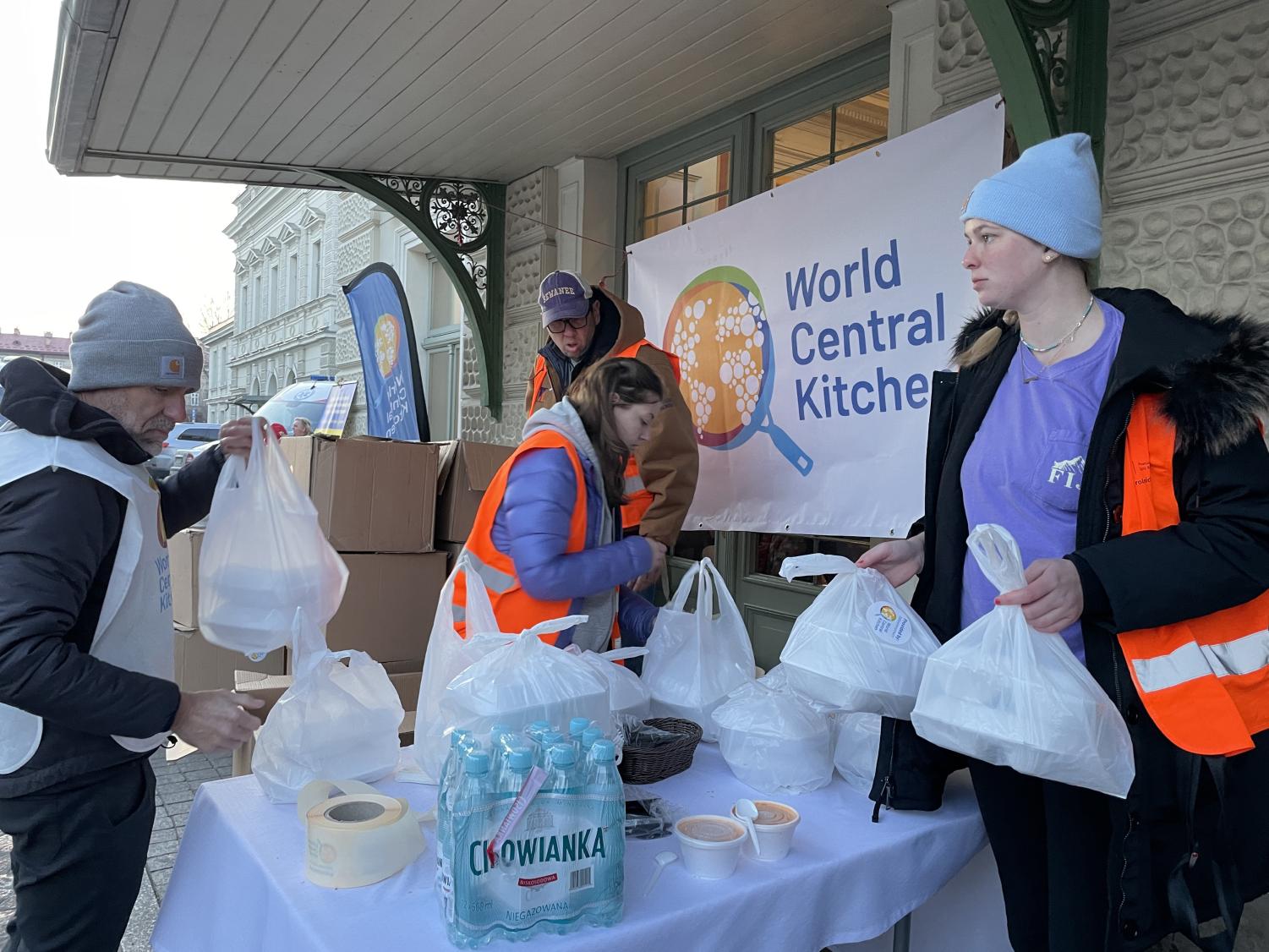
Each translation was a personal interaction—a personal story from individual immigrants.
“When you’re helping people out, you start to hear their stories,” Sasha said. “I would hear about how when they were at their house, they would turn off all the lights, hide under the stairs and would just be crying. A woman cried to me about leaving behind her son, and it was just so hard to listen to.”
In addition to their work on the front lines, the Konradis set up a GoFundMe to raise money to support Ukrainian immigrants.
Their original goal was $10,000.
“I was not expecting that at all,” Sasha said. “I was like, ‘Let’s be honest, that’s not going to happen.’”
Now they’ve raised more than $85,805.
“My family had posted about it, and people were super generous,” Sahsa said. “They started to donate a lot, and we got a lot of money. It’s amazing.”
The Konradi family plans to donate the money to the World Central Kitchen, an organization they worked with to prepare meals for and distribute food to Ukrainians.
“They prepare over 160,000 meals a day that they are shipping all over the area — both into Ukraine itself and all along the border in Poland, Romania and Moldova,” Ann Tyler said. “We told people that we would be giving the money to the organization that we saw with our own eyes was doing the most for refugees.”
Despite the work they have put in, more help is needed.
“We were really just helping with an acute crisis situation,” Ann Tyler said. “The long-term need is to assimilate this population of refugees into other countries with housing and jobs. The European countries are taking on the bulk of the refugees, and they need to figure out how to allow people to get skilled jobs as quickly as possible.”
Sasha isn’t finished though. She hopes to continue to volunteer and support Ukrainian immigrants into the future.
“I feel like this is the first step to many steps that I’m going to take,” Konradi said. “This is opening me up to other issues.”



